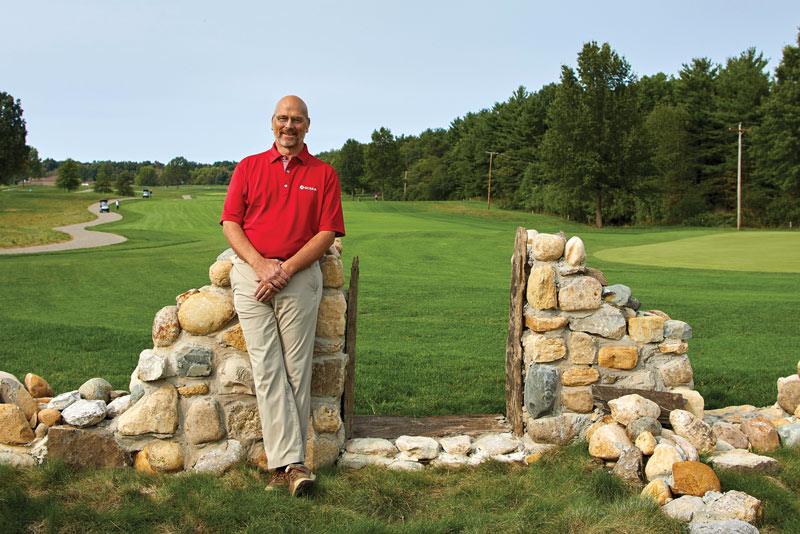
Ohio’s own: Mark F. Jordan, CGCS, at Westfield Country Club, the 36-hole facility in northern Ohio where he has worked since 1988. Photo by Maggie Miller/TRG Multimedia
If there is indeed a right time and right place for everything, then GCSAA and its worldwide membership should feel fortunate that it has the right person to go along with that time and place in its 85th president, Mark F. Jordan, CGCS.
At least that’s the view among those who know Jordan best. Navigating a national association through a persistent global pandemic and all the organizational, financial and societal challenges that come with it will require a steady, patient and thoughtful hand. To those who have seen Jordan as a golf course superintendent, a volunteer and a family man, that describes Jordan to a T.
Kyle Smith is among those confident in Jordan’s abilities to manage the tumultuous year to come. The GCSAA Class A superintendent and Jordan’s top lieutenant at Westfield Country Club in Westfield Center, Ohio, Smith has had a front-row seat to Jordan’s composed, measured demeanor throughout Smith’s 16 years at the club.
Those characteristics were especially beneficial during a large-scale renovation of Westfield CC that Jordan oversaw as project manager. It was a comprehensive, complicated five-year effort that included master planning and an in-depth refresh of all 36 holes at the club, as well as the construction of a new, state-of-the-art practice facility.
As Smith sees it, if Jordan was able to manage the chaos that came with a project of that scope, his day-to-day duties as Westfield CC’s natural resource leader, an active family life, church and civic pursuits, and his role on GCSAA’s Board of Directors, then serving as the association’s president in 2021 should be a piece of cake.
“There’s always a lot going on here, and I’ve always admired Mark’s ability to just ... flip a switch, to move from one thing to another and always be engaged and thoughtful about what he was focused on,” says Smith, a 19-year GCSAA member. “You never know if the previous conversation had been a heated debate or involved a difficult decision. He’s always been able to stay cool, be reasonable and balance that workload and the stress that comes with it. I don’t see him being any different as GCSAA president.”
Jordan’s wife of 33 years, Melinda, couldn’t agree more. “I have no doubt that he’s the right person (for this point in time),” she says. “He’s going to find a way to help move things forward for the association. It’ll be an interesting year, for sure, but I know whatever happens, he’ll be able to look back on it with pride.”
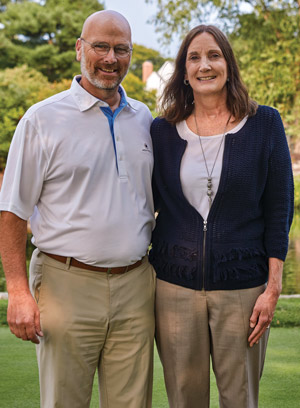
Right: Jordan and his wife, Melinda, are both longtime employees of Westfield Insurance, the company that owns and operates Westfield Country Club. Photo by Maggie Miller/TRG Multimedia
And while Jordan might blush a bit at all the plaudits, he says he’s ready to shoulder the expectations that others have for him as he guides GCSAA through the coming months. “I feel like I’ve grown as a board member and added a perspective that is going to allow me to focus on the big picture,” the 34-year GCSAA member says. “It’s about understanding that I represent the whole, that what we do is for the good of the entire membership versus the good of individuals. That’s been a great lesson for me, and I plan to apply it as president.”
Famous footsteps
That Jordan finds himself in this position, armed with the temperament and the experience to succeed in the role of GCSAA president despite trying times, shouldn’t come as much of a surprise. After all, he had a really good role model.
John Spodnik is a legendary turfgrass manager in Ohio, a 62-year member of GCSAA whose influence has stretched far beyond the borders of the Buckeye State. He was GCSAA’s president in 1969, the man responsible for bringing Jordan to Westfield CC in 1988, and a mentor without equal who set an example for Jordan to follow at home, on the job and in service to the industry.
“John has been a great support for me over the years and a great mentor,” Jordan says. “It’s hard to put into words what he’s meant to me. I have a lot of respect for what he’s done, not only for me, but for Westfield and the industry as well.”
It might be a little oversimplified to give Spodnik sole credit for setting Jordan on a path toward a place on GCSAA’s national board and his eventual ascension to the association’s presidency. The father of four has always displayed a philanthropic streak, and being active in his church, as a coach in youth sports and in his industry have long been parts of his life.
But even though he had years of board service under his belt and had served as president of the Northern Ohio GCSA and the Ohio Turfgrass Foundation prior to his first run at the national board in 2012, Jordan recognizes — and appreciates — the “instrumental” role Spodnik played in helping him to this point in his career.
“John called in a lot of chips on my behalf with some really influential people in the industry,” Jordan says. “Even though I had been really active in Ohio, some might say I probably didn’t give myself enough exposure nationally. John changed that. He called around, told people, ‘Hey, we’ve got this guy in Ohio with a lot of good ideas, a lot to contribute.’ John was so respected in the industry that when he said something, folks listened, and I can’t express how much that meant to me.”
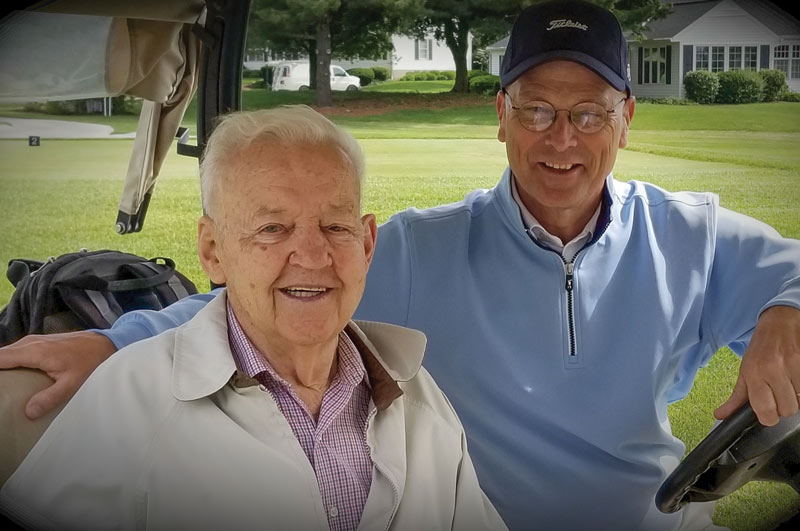
John Spodnik (left) has been one of Mark Jordan’s primary mentors. Photo courtesy of Mark Jordan
The qualities and the potential that Spodnik saw in Jordan are the same that have been evident to both his leaders and his co-workers at Westfield Insurance, the company that owns and operates Westfield CC, who have watched and marveled at his work during his long tenure with the company.
“Mark has a humility that he brings to how he goes about his work that I think is a great role model for others to follow,” says Stuart Rosenberg, Westfield Insurance’s chief innovation and strategy officer. “He’s innovative and takes responsibility for shaping the future, which I think is really important for those in leadership.”
Amy McNutt is Westfield’s country club operations leader, a post that can best be described as a hybrid between a traditional country club general manager and a corporate-focused hospitality, sales and marketing professional. She moved into that position in late 2018 and admits to leaning heavily on Jordan’s experience with the company and his sage advice as she has grown into her new role.
“I often find myself thinking, ‘Well, what would Mark think about this in this scenario?’ or ‘Let me call Mark and to see if I’m off base or if I should think about something differently,’” McNutt says. “He just is so insightful. And I think that the reality for Mark is that he does have years and years of golf industry experience, but he also has the openness to continue learning and try new things. And that has been so helpful for me in my role.”
And Kirk Barry, who leads general services and hospitality operations for Westfield Insurance and is Jordan’s direct leader, says, “Mark will be very inclusive and very collaborative (as GCSAA president). He’s going to invite people into the conversation to help ... make the right decisions, not Mark decisions.”
The natural
Mark Fitzgerald Jordan was born on Nov. 22, 1963. And if the importance of that date doesn’t immediately register with you, then his middle name, which helps commemorate the day, may provide an additional hint as to why it’s such an important one (aside from it being Jordan’s birthday, of course).
“It was obviously going to be a stressful day for my mother anyway, but the (President John F.) Kennedy assassination just increased that,” Jordan says. “She always used to tell me about the day, give me some insights into what it was like. It’s certainly an interesting conversation starter.”
Jordan grew up in the small rural town of Nova, Ohio, a little more than 20 miles west of where he now calls home. In fact, aside from his college days at Ohio State in Columbus and stints as an assistant superintendent at courses in both Columbus and Cincinnati early in his career, Jordan has rarely strayed far from that part of Ohio.

The 17th hole on Westfield Country Club’s South Course. Photo courtesy of Westfield Country Club
Both parents — his father, Sidney, and his mother, Ardith — played some golf, but Jordan says an excursion as a sixth grader to a local mom-and-pop course with a buddy and the start-up business they concocted first opened his eyes to a future in golf.
“This friend lived right next to the golf course, so we’d go look for golf balls and then sell them to the golfers on the course,” he recalls. “My friend got bored of that pretty quickly, but I thought it was all pretty cool. And the more I went, the more interested I got.”
Eventually, the course’s owner grew wise to Jordan’s business scheme and put a stop to it. In exchange, though, he offered him a job at the course washing golf carts. The small salary he got paled in comparison to the free golf he was allowed to play, and, he says, “It’s been a great marriage ever since.”
“Melinda will attest to this, since we dated in high school, but I spent virtually every waking moment in the summers on the golf course, whether it was working or playing,” Jordan says. “I just fell in love with the game and golf course management at that point.”
As if he needed any more convincing, a visit to Ohio State’s Agricultural Technical Institute (ATI) in nearby Wooster and exposure to its turfgrass management program sealed the deal. Jordan ultimately completed the two-year program there, then got a four-year degree in turfgrass and plant sciences from Ohio State in Columbus. His career path was set.
“When I think back to high school and everyone we knew, Mark was one of the very few people who knew exactly what he wanted to be even then,” Melinda says. “He knew he was going to be a golf course superintendent. He has a passion for the game. There’s just something about it that captured his imagination back then, and it still does today.”
Home away from home
Jordan’s first encounter with Westfield CC and John Spodnik did little to portend the long, warm relationships he would develop with both.
Looking for an internship following his first year at Ohio State ATI, Jordan was granted a sit-down with Spodnik, who was overseeing real estate and golf course operations for Westfield at the time. The interview didn’t last long.
“We sat down for about five minutes before he said, ‘Look, we don’t have any internship positions available. We’ve already got our staff set up,’” Jordan says. “I joke with John about that, telling him that me being here now is the good Lord’s way of proving that he made a mistake in not hiring me the first time.”

The par-4 first hole on the North Course at Westfield Country Club. Photo courtesy of Westfield Country Club
If it was indeed a mistake then, it was one Spodnik and Westfield wouldn’t repeat. In need of an assistant superintendent for the club’s South Course in the summer of 1988, Westfield CC reached out to Jordan, who at the time was working at Winding Hollow Country Club in Columbus. Jordan already had a connection with the company — Melinda was working as a field marketing representative for Westfield Insurance; her tenure with the company is now in its 35th year — so the inquiry wasn’t completely out of the blue.
But it was timely. Jordan admits to being restless in his position at Winding Hollow, and the challenges and opportunities at a 36-hole facility like Westfield CC intrigued him. After a second interview, he was offered and accepted the job. (“I started on Nov. 14, 1988, and Melinda and I got married on Nov. 14, 1987, so two big anniversary dates that are pretty easy to remember,” Jordan says.) He’s been with the club and the company ever since.
While his place of employment may have stayed the same over the course of three decades, his responsibilities there certainly have not. “I’ve had more titles than the New York Yankees,” Jordan says with a laugh.
He’s been an assistant superintendent and managed the South Course as superintendent. He was promoted to club manager and then general manager, spending six years in those roles. And he’s held the title of natural resource leader — overseeing golf-related properties and providing leadership for the Hospitality Business Unit (a shared duty with four other peers) — for the past several years.
Ken Rockhold is a retired Westfield Insurance agent who joined the club the same year Jordan did and now lives in a home off the South Course’s first hole. He and Jordan have worked together on the club’s Golf Course Advisory Committee and have cultivated a close friendship. He says Westfield CC members hold Jordan in the highest regard — a fondness born of his dedication to the club and the company and his willingness to put the club’s success ahead of his own.
“Mark is one of the most compassionate people I’ve ever met,” Rockhold says. “He’s a good listener. He doesn’t always agree with you, but you know that he heard you and that he’ll come back with a well-reasoned answer about why he doesn’t agree with you or why he made a different decision. Members appreciate that about him.”

The golf course management team at Westfield Country Club, led by Jordan (front and center), includes (clockwise, from left) Todd Underwood, assistant superintendent; Bill Thomas, assistant superintendent; Kyle Smith, superintendent; Dan Bauman, horticulturalist; Tom Hilton, equipment technician; and Drew Reed, assistant superintendent. Not pictured is Jeremy Meadows, equipment technician. Photo by Maggie Miller/TRG Multimedia
Asked whether he’d ever had a wandering eye during his time at Westfield CC, Jordan says, “For me, it’s always been about personal growth and development. Westfield is a great company to work for, and they’ve always offered me those things, so even though people have reached out on occasion ... I’ve never seriously considered leaving. This is home.”
Proud parent
When Westfield Insurance first opened for business in 1848, its goals were modest — to provide agricultural and property insurance for farmers in Ohio who had grown weary of dealing with big firms on the East Coast who knew next to nothing about farming.
The company still takes care of those agricultural interests, but those original customers wouldn’t recognize much else about today’s Westfield. The company now offers small-business and commercial coverage along with personal, home and auto insurance. It’s one of the largest nonpublic employers in Ohio, with nearly 2,500 employees, most of whom work out of the company’s sprawling campus near the country club in Westfield Center, located about 40 miles southwest of downtown Cleveland.
And the company has diversified outside of insurance, a process that began way back in 1937. Seeking a way to better cultivate relationships with customers, agents and other stakeholders and to create a competitive advantage, company leaders decided to make golf an integral part of its business, opening a nine-hole course that year on a small parcel of farmland it owned.
Westfield’s investment in golf has grown into the 36-hole country club that now falls under Jordan’s watchful eye. And its hospitality portfolio has expanded as well and now includes a conference center located on the company’s corporate campus and a 65-room inn.
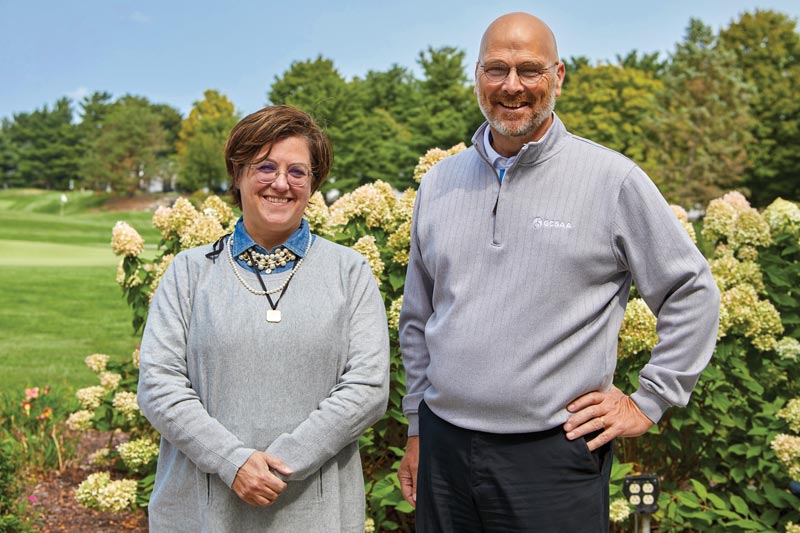
Jordan with Amy McNutt, Westfield’s country club operations leader. Photo by Maggie Miller/TRG Multimedia
Westfield CC has had its time in the national tournament spotlight over the years, hosting the Junior PGA Championship from 2001 to 2007 and the Junior Ryder Cup in 2004. But in 2013, with many elements of the golf facility in need of an upgrade to maintain Westfield’s high standards and stay true to what it calls its “entertain at home” philosophy, the company decided the time was right to embark on a golf course master plan. Looking for a firm that would blend Westfield’s corporate culture with course needs, the company found one not far from home in Columbus-based Hurdzan Golf Design, which was commissioned to create that master plan in 2014.
The scope of the plan was exhaustive and included a three-year construction timeline. The primary goal of the project was to create unique golf experiences for corporate guests, agents, employees and members. It included a new 20-acre practice facility with a 25,000-square-foot Himalayan style putting green. The two courses were redesigned with distinct characteristics — the parkland-style South Course with bentgrass tees, fairways and greens, and the Midwest-links-style North Course with fescue rough areas, fieldstone walls, timber and sod-wall bunkers, and a Scottish ruin feature. Project partners included Mike Kuhn as irrigation consultant, Leibold Irrigation and Landscapes Unlimited.
And at the heart of it all was Jordan, who served as project manager, a conduit between the corporate and golf sides of the equation.
“If you think of the Pink Floyd album cover (for “The Dark Side of the Moon”), where the light comes in one side ... through a narrow opening, then comes out the other into a full spectrum, that was Mark,” says Mike Hurdzan, principal architect on the project. “Everything passed through Mark. He was that prism. There were golf interests and there were corporate interests, and those had to be balanced. That was Mark’s job.”
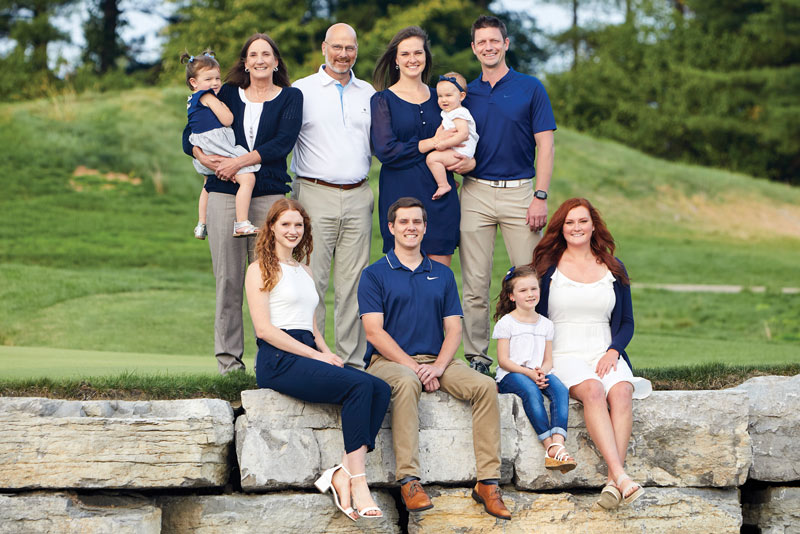
Jordan (back row, second from left) with (front row, from left) daughter Janelle; son, Nate; granddaughter Natalie; and daughter Mckenna. In the back row (from left) are his wife, Melinda, who is holding granddaughter Evelyn; his daughter Alaina, who is holding granddaughter Lucia; and Alaina’s husband, Adam. Photo by Maggie Miller/TRG Multimedia
The practice facility was first on the agenda; work began on that in 2017, and the facility opened for business in June 2018. Next up was the South Course, which closed immediately following the club championship in August 2017 and reopened in June 2019. Finally, attention turned to the North Course in early December 2018. It welcomed golfers back late last summer.
From start to finish, the renovations at Westfield were as complex as they come. Jordan allowed Smith (and former South Course superintendent Ben Imhoff) to lead the day-to-day, boots-on-the-ground construction work while he kept an eye on the field work and funneled news and information upward to Barry, Rosenburg and other executives with Westfield Insurance. “There are a lot of checks and balances here, so things are never one person’s decision,” Jordan says. “It’s about group decisions and ensuring we have direction, alignment and commitment with those involved in the decision-making process.”
Oh, and to make matters just a little more interesting, Jordan’s time on GCSAA’s national board corresponded nicely with the renovation. Balancing it all became Job One for Jordan.
“My biggest takeaway from it all was the value of managing up and influential leadership,” he says. “That was a quick learn for me early on, to just keep all levels of stakeholders in the loop. Even if there was nothing to report, tell them there was nothing to report. That was key.
“And with Kyle, we’ve worked together long enough that he knows when to float things up to me and when he can make the call himself. When I wasn’t available to make a decision, I trusted him to make the call. We have a tremendous golf course maintenance team that supported us through the project. Without their dedication and passion for the work, it would have been hard to bring this all together.”
Off and running
All of that brings us back to Jordan’s next big project — the presidency of GCSAA. While he acknowledges the uncharted, pandemic-influenced waters he and his fellow board members will have to maneuver in the next 12 months, he still hopes to focus considerable time continuing the execution of ongoing efforts by the association (see “Brave new world: What’s ahead during Mark Jordan’s GCSAA presidency,” below).
One of his colleagues at Westfield CC, club professional Chad Kitzmiller, knows Jordan is ready for the challenge. “Mark is always learning, always curious and always willing to listen as a way to improve, to grow, to change,” he says. “Those are incredible characteristics that I don’t see in too many people, and they’re great characteristics for someone who is going to lead an organization like GCSAA.”
“I know this is a big-time commitment, but I’m ready,” Jordan says. “I’ve got a great employer and an awesome family who fully support me in this endeavor. My involvement with this association has always been a labor of love for me. I can’t wait to get started.”
Brave new world: What’s ahead during Mark Jordan’s GCSAA presidency
Mark Jordan, CGCS, is a self-professed planner, an organizer of the highest order. You don’t successfully balance all that comes with his role at Westfield Country Club and his volunteerism with GCSAA without that level of discipline.
Still, even Jordan admits that all the planning in the world might not adequately prepare him for the coming year and his role as GCSAA president, a 12-month stretch that promises to be as uncertain and unpredictable as any that has come before it.
“There is light at the end of the tunnel,” Jordan says optimistically. “But that doesn’t mean there won’t be challenges along the way and unexpected developments to deal with.
“I watched closely this past year as John (Fulling, GCSAA’s president in 2020) maneuvered through everything that came with the pandemic. He and I are of the same mindset: Being president isn’t about going to all the big events and being a public figure. We’re here to serve the association, our members and the industry in whatever capacity we can. That’s going to be my focus this year.”
Topping the list will be the future of GCSAA’s flagship event, the Golf Industry Show. COVID-19 forced the association to transform the 2021 event into a virtual one, which it successfully pulled off one month ago. But now, all eyes turn toward the 2022 event scheduled in San Diego and whether circumstances will allow for a return to a traditional in-person format next February.
Jordan is right there with those chomping at the bit to return to physical classrooms, exhibit halls and networking events in 2022. But he wants that return to be done safely and smartly.
“I know a lot of our members are anxious to get back to what GIS has always been, or at least a hybrid version of that. I feel the same way,” Jordan says. “But we have to be smart about it. There is a lot of research to do, a lot of due diligence to undertake in order to formulate a strategy and make the best decision. I view this as a great opportunity for GIS, for us to think about alternative options so we set ourselves up for success down the road.”
Jordan also sees promise in other legacy programs and initiatives from GCSAA that were paused in 2020 because of the pandemic, most notably the First Green educational program. He’s also bullish about ongoing efforts focused on assistant superintendents and equipment managers and the association’s membership-growth initiatives.
But he also sees bright days ahead for fresh, new initiatives, most notably a diversity-and-inclusion push that will have Jordan’s full attention in 2021. He’s especially excited about an industry-wide work group focused on that topic that will feature GCSAA in a leading role.
“There are diversity-and-inclusion elements to a lot of what we do already, but we think this advisory council can and will provide perspectives on what we can do as an industry to create awareness of careers and promote opportunities in the game of golf for minorities and for women,” Jordan says. “I’m excited about what we’re looking to do and what we can achieve. I think we can create a sustainable plan for the underserved in the game of golf and in golf course management.”
Family focused
When Mark Jordan says, “Family is a big part of who I am,” those who know GCSAA’s 85th president nod knowingly.
Truth be told, that’s quite an understatement. Family forms the foundation of all that Jordan is as a man, a golf course superintendent and a volunteer leader. It also explains why he’s spent most of his life in north-central Ohio, not far from the small town of Nova — where he was born and reared — and nearly all of his immediate family.
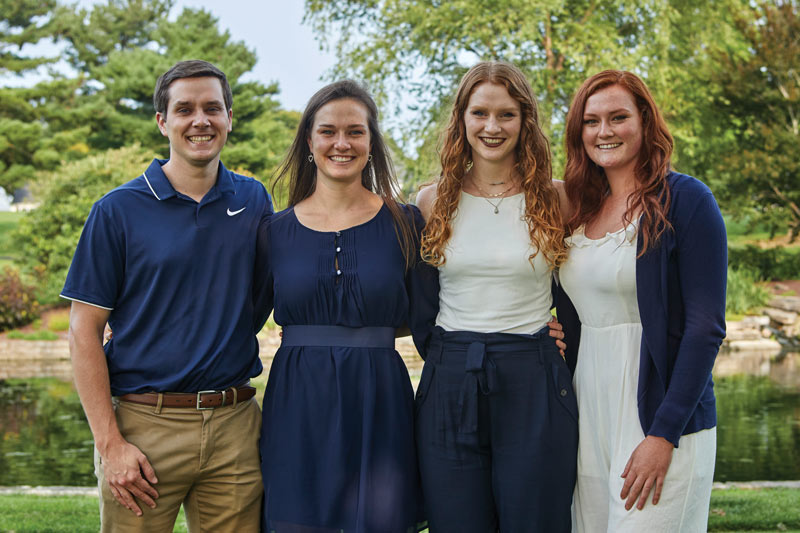
Photo by Maggie Miller/TRG Multimedia
And it’s why GCM went to his four children — (above, from left) son Nate, 29, and daughters Alaina, 27, Janelle, 24, and Mckenna, 20 — to get deeper insights into Jordan and what he will bring to his role with GCSAA over the next 12 months. Each was asked to share stories that might illustrate what kind of leader and president Jordan will be, memories that highlight the qualities and characteristics he will bring to the office. Their answers have been edited here for length.
Nate Jordan
“I was 16 years old when the final book of the Harry Potter series was published. On the day it came out, I read it nonstop through the night, as I wanted to learn the fates of my favorite characters. Even though my dad had volunteered us to help seed three lawns for Habitat for Humanity the next day, I kept reading long into the night and eventually finished after 5 a.m. Being a 16-year-old, I naturally wanted to get as much sleep as I could that morning instead of getting up and heading out to the Habitat House at 8:30, which was our original plan.
“I can remember my dad waking me up and saying that we needed to go and get the job done like we promised. It was that simple. The fact that I stayed up late to do what I wanted should not affect the promises we made. Eventually seeing that arguing would be pointless, I got myself up and around and helped my dad seed and straw the three lawns in 90-degree heat. Even though that day seems like a blur, I can remember learning that when you make a promise to someone, you keep it. You need to be responsible for your own actions.”
Alaina Michel (Jordan)
“My dad always made me feel special. He is a phenomenal listener and always gave me his undivided attention, which is not easy to do when you have four children. Before I was married (and even sometimes now), he would take me on ‘dates,’ always letting me choose the restaurant. On these special occasions, he would give me his undivided attention and catch up with me, asking me questions and listening. That meant the world to me ... and impacted my life profoundly. Now, ‘dating’ is something I do with my own children. He set an example for me on how to lead, which enabled me to grow up into a leader myself.”
Janelle Jordan
“One of my dad’s strongest leadership qualities is his ability to bring others on board with a goal or project and empower them to take ownership of it. He is well known in our family as the master delegator. Delegation is an effective way for him to manage what is on his plate and empower someone else to take charge by giving them some ownership in the project. While it is generally a strong quality at work and with his role on the board, it can be a bit frustrating when he tells you to do something that you heard mom ask him to do five minutes ago.”
Mckenna Jordan
“It is an ongoing joke at the Jordan house that when we can’t find my father, we all say, ‘He’s up at the course,’ because, in reality, in most cases, he really is. If I want to see my dad in the summer, I should just hang out at the golf course; otherwise, I might not see him until winter. His work ethic is impeccable ... he works so hard and loves every minute of it. He sets a standard of diligence in the workplace and in our household. He shows that if you are going to put your time into something, put your heart into it too. He loves what he does, and it shows. This type of attitude makes everyone else around him work harder and be motivated to do great work. He is an amazing leader, and I am so blessed to have him as
my father.”
Scott Hollister is GCM’s editor-in-chief.